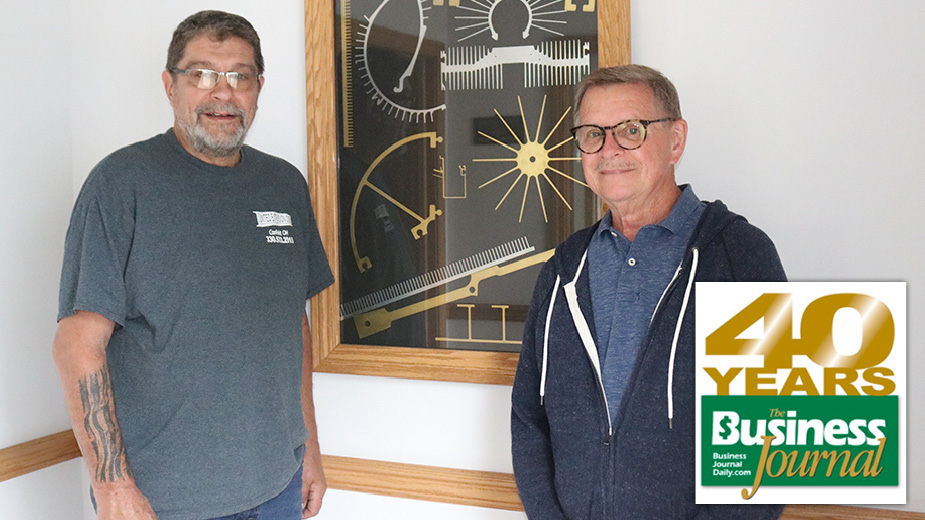BOARDMAN, Ohio – When the tool and die company they worked for closed right after employees voted to unionize, those employees decided to start their own company.
So it was that United Extrusion Dies Inc. was born in 1984.
John Fritz, president; James Rektor, vice president; and Steve Fryda, plant manager, led that leap of faith 40 years ago. They obtained machinery and began operations in a small building on Southern Boulevard in Boardman. All of the employees of the company that closed came with them.
Today, United Extrusion Dies manufactures aluminum extrusion dies up to 25 inches in diameter and all other related tooling – whatever their customers across the country need for extruding aluminum.
A supplier to some of the top extruders in the country, United Extrusion sends its products to Columbus, Virginia, Tennessee, Arizona and to the state of Washington.
From the beginning of the company, United Extrusion Dies enjoyed success.
“We are fortunate that the customers stayed with us,” Fryda says.
“We succeeded in not stopping deliveries and quality,” he continues. “Back then it was about when can we get it and making sure that the product was good. Pricing wasn’t so much of
an issue back then as when customers could we have it.”
Fritz says he still has letters the company received from customers early on that praised their 99.9% on-time quality, which was how they built the business.
Within a year, Fritz says he was looking for a larger location. With what remained of the steel industry still declining, 1,000 acres of property owned by American Fire Clay and Products Co. was being auctioned.
Fritz purchased the property, the company’s current site at 5171 W. Western Reserve Road. The site included a big empty building with easy access for trucks. He was confident it was the right decision, assuring doubters within the company, “We can make it ours.”
United Extrusion Dies is equipped with a variety of newer CNC machines that can quickly turn out what is required. But it is also operating two machines from the World War II era.
“They don’t make them like that anymore,” Fryda says.
And the company still has blueprints from the 1950s. Fritz explains that a company he worked for early in his career, Spencer Tool and Die Manufacturing, was the first to develop hollow dies. This entails extruding a hollow shape, meshing on the other side and coming out in one piece.
Working in this industry throughout his career, Fritz, now 77, notes that northeastern Ohio and western Pennsylvania is where so much of the extrusion industry was developed and evolved.
“The equipment has changed the industry so much. It’s so fast,” Fritz says.
“Something that would take me a whole day to do 10 years ago, [now] can take you an hour to do,” says Fryda. “The technology has gone over and above anything I ever thought it would.”
Although the company had some rough patches, like when some of their customers went bankrupt and struggled to pay them, Fritz and Fryda are proud that they have never laid anyone off in 40 years. Even if it meant paying employees to clean up the shop between jobs, they paid them and kept it going, which Fritz attributes to being frugal. And they shared the company’s success.
Treating employees with respect, providing 100% of the cost of health care, and giving bonuses are the reasons why Fritz believes many employees have remained loyal.
“I always felt that you ask somebody to do something,” Fritz says. “You just have to ask and they were good employees, they did [it]. Always treat them the way you want to be treated. I think that makes for a good relationship.”
Fritz and Rektor are now semi-retired and do not come to work as often as they once did. Fryda keeps them in the loop on major decisions and runs the operation.
At one point at least 15 worked at United Extrusion Dies, but now there are seven. “For a small crew, they do an amazing job,” Fritz says.
Fryda says when someone retires there is not enough help, even in the current economy, which has been tough on the aluminum industry.
United Extrusion Dies is hiring but finds it difficult to find skilled trades people – the next generation who will continue in the industry.
“We’re hoping to find a programmer, because that’s going to decide the future of this place,” Fryda says, anticipating another retirement.
“We could grow more if we could find people to employ,” Fritz adds.
Pictured at top: Steve Fryda and John Fritz show some of the products their company has made.
